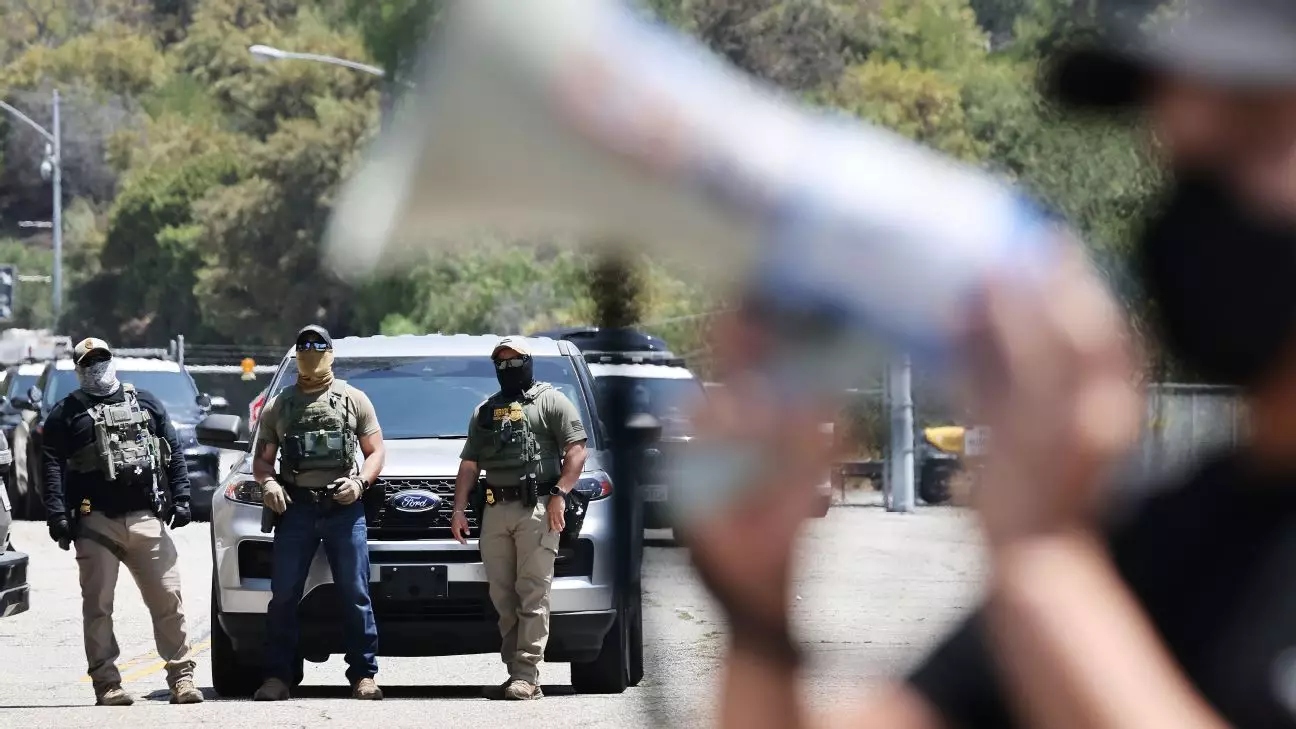In a city known for its vibrant diversity and cultural tapestry, Los Angeles stands as a crucible for social change, particularly concerning immigration issues. The recent incident at Dodger Stadium, where federal agents from the Department of Homeland Security attempted to set up outside the venue, is a stark illustration of this conflict. On a seemingly ordinary Thursday morning, what should have been a celebration of community and sport turned into a flashpoint for dissent against immigration enforcement. The events that unfolded that morning not only disrupted the Dodgers’ plans for announcing initiatives aimed at supporting local immigrant communities but also reflected the heightened tensions surrounding federal immigration policies.
With a caravan of unmarked federal vehicles escalating into a public-affairs scenario, the situation quickly spiraled into a broader protest against perceived injustices within the immigration system. The response from the Los Angeles Dodgers, who denied federal agents access to the stadium’s parking lot, demonstrates a growing awareness among professional sports organizations of their roles as cultural influencers. The decision to postpone the initiatives reveals a delicate balancing act; the Dodgers are navigating the treacherous waters of public opinion while trying to maintain community ties, a challenge intensified by the presence of federal enforcement agents.
The Clash of Narratives
The swift reaction on social media further magnifies the clash of narratives surrounding immigration enforcement in Los Angeles. After local media reported on the federal presence, the ensuing backlash exemplified how deeply this issue resonates with a broad swathe of the community. Social media became a platform for outrage, fueling protests that aim to assert a collective identity against what many consider overreaching governmental authority. The protestors gathered outside Dodger Stadium—some even blocking major thoroughfares—voiced their discontent and solidarity with immigrants, highlighting the urgency and intensity of the civil rights struggle in contemporary America.
Furthermore, it is crucial to dissect the conflicting statements from the government agencies involved. The Los Angeles Dodgers initially reported that the agents were with U.S. Immigration and Customs Enforcement (ICE), only to have the agency outright deny its involvement. The Department of Homeland Security clarified that the agents belonged to Customs and Border Protection (CBP), attempting to downplay the incident as unrelated to any significant enforcement action. Such obfuscation is emblematic of a larger pattern seen across different levels of government—attempting to mitigate the fallout from actions that elicit widespread anxiety and protest within communities.
The Ripple Effects on Local Initiatives
What the Dodgers’ postponement of their announcement regarding immigrant support programs underscores is the fragility of progress in times of crisis. Often, initiatives geared toward uplifting marginalized communities can be stymied by the whims of political maneuvers and the unpredictability of federal enforcement. The Dodgers, expressing their intent to ally with local immigrant services, found their plans thwarted in a moment of heightened urgency. Community organizers and advocates now face the daunting task of recalibrating their efforts in what feels like a relentless cycle of resistance against punitive measures targeting the immigrant population.
In the wake of protests and civil disobedience that have boiled over into confrontational interactions with police, the broader picture reveals a community grappling—not only with fear and uncertainty about deportation and family separation—but also with the need for resilient infrastructure that supports immigrants. The ongoing presence of ICE, as reported across various public spaces such as libraries and marketplaces, creates a climate of fear that hampers engagement and healing.
A City Divided Yet United
Ultimately, Los Angeles serves as a microcosm of a nation grappling with fundamental questions of identity, belonging, and justice. In a time when divisive rhetoric frequently permeates public discourse, the resilience of its communities shines through the darkness. While agencies tout their narratives and paint a less damning picture of the enforcement landscape, the collective consciousness of Angelenos grows more determined to challenge injustices and uphold their voices in the face of adversity.
The events at Dodger Stadium are merely a localized instance of a nationwide struggle, but they encapsulate the urgency for solidarity and resilience among those committed to fighting for human rights. As professional organizations take a stand and individuals rally together, the assertion of dignity and community can emerge as powerful responses against any form of oppression.

